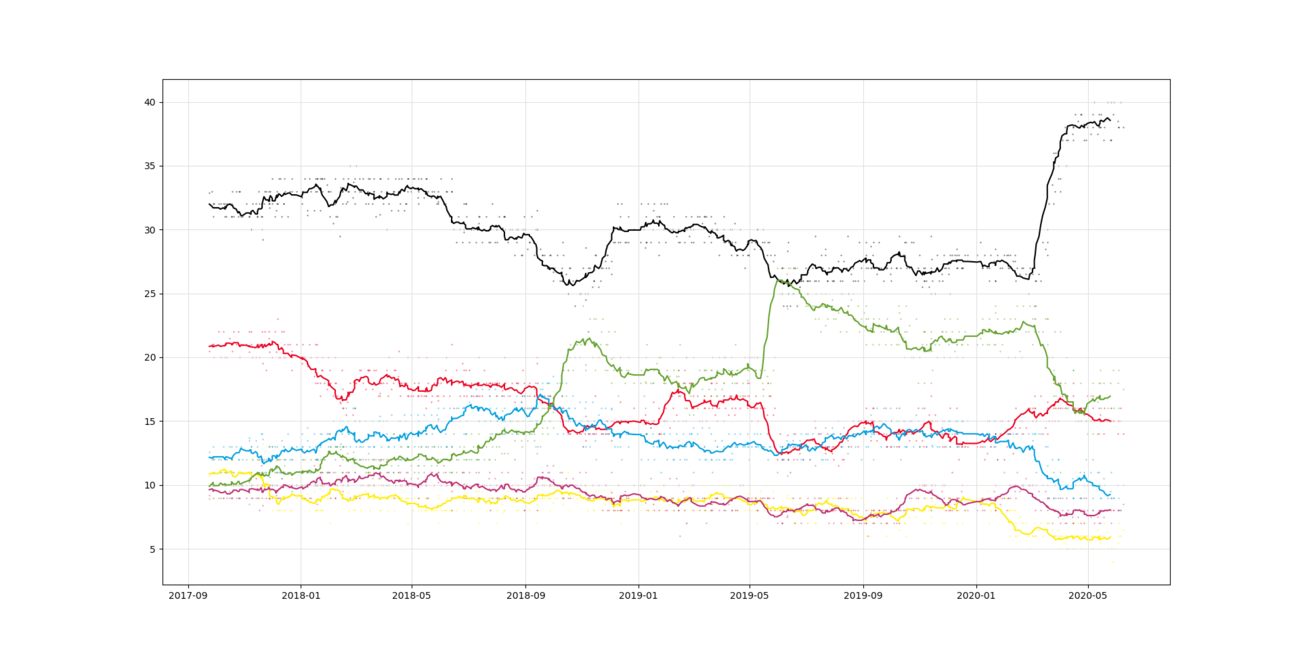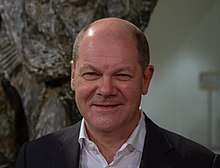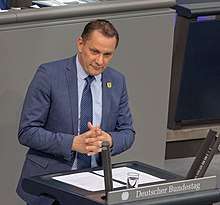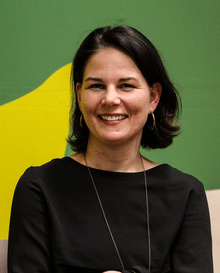Next German federal election
The next German federal election for the 20th Bundestag is expected to be held between August and October 2021.[lower-alpha 3]
| |||||||||||||||||||||||||||||||||||||||||||||||||||||
All 598 seats in the Bundestag (plus overhang and leveling seats) 300+ seats needed for a majority | |||||||||||||||||||||||||||||||||||||||||||||||||||||
|---|---|---|---|---|---|---|---|---|---|---|---|---|---|---|---|---|---|---|---|---|---|---|---|---|---|---|---|---|---|---|---|---|---|---|---|---|---|---|---|---|---|---|---|---|---|---|---|---|---|---|---|---|---|
| Opinion polls | |||||||||||||||||||||||||||||||||||||||||||||||||||||
| |||||||||||||||||||||||||||||||||||||||||||||||||||||
| |||||||||||||||||||||||||||||||||||||||||||||||||||||
Background
Previous election
The 2017 federal elections were held after a four-year grand coalition between the CDU/CSU and SPD. Though the CDU/CSU remained the biggest parliamentary group, both it and the SPD suffered significant losses. The SPD leadership, recognizing the party's unsatisfactory performance after four years in government, announced that it would go into opposition.[1] With the CDU/CSU having pledged not to work with either the AfD or The Left before the elections, the only remaining option for a majority government was a Jamaica coalition consisting of the CDU/CSU, FDP, and the Greens.[2][3] Exploratory talks between the parties were held over the next six weeks, though on 20 November the FDP withdrew from the negotiations, citing irreconcilable differences between the parties on migration and energy policies.[4][5] Chancellor Angela Merkel consulted with President Frank-Walter Steinmeier, who implored all parties to reconsider in order to avoid fresh elections.[6][7]
Consequently the Social Democrats (SPD) and their leader Martin Schulz indicated their willingness to enter into discussions for another coalition government with the CDU/CSU.[8] The SPD leadership voted to enter into exploratory discussion on 15 December 2017[9] and at a party congress in January 2018 a majority of the party’s delegates voted to support the coalition talks.[10][11] The text of the final agreement was agreed to by the CDU/CSU and SPD on 7 February, though was conditioned on the approval of a majority of the SPD’s party membership.[12] The 463,723 members of the SPD voted to approve or reject the deal from 20 February to 2 March,[13][14] with the result announced on 4 March. A total of 78.39% of members cast valid votes, of which 66.02% voted in favor of another grand coalition.[15] Merkel was voted in by the Bundestag for a fourth term as Chancellor on 14 March, with 364 votes for, 315 against, 9 abstentions, and 4 invalid votes – 9 more votes than the 355 needed for a majority.[16] The new government was officially referred to as the Fourth Merkel cabinet.
Party leadership changes and political instability
Merkel’s new government was subject to intense instability. The 2018 German government crisis saw the longstanding alliance between the CDU and CSU threaten to split over asylum seeker policy. Interior Minister and CSU leader Horst Seehofer threatened to undercut Merkel’s authority by closing German borders for asylum seekers registered in another European Union (EU) country. The split, eventually repaired following a summit with EU countries, threatened to bring down the government.[17] Seehofer was replaced as CSU leader at a party conference in January 2019, though he retained his position as Interior Minister in the Cabinet.[18]
Merkel herself announced she would resign as leader of the CDU at the party’s conference in December 2018 and step down as Chancellor of Germany at the forthcoming election, following poor CSU results at state elections in Bavaria and for the CDU in Hesse.[19][20] Merkel’s preferred candidate for the party leadership, Annegret Kramp-Karrenbauer, narrowly defeated conservative rivals who opposed Merkel’s leadership.[21] Kramp-Karrenbauer however struggled to unify the party’s liberal and conservative factions, and in February 2020 she announced her intention to step down as CDU leader and withdraw her interest in running as the party’s nominee for Chancellor at the election.[22] The CDU has yet to elect a new candidate.
The other party in the coalition government, the SPD, also had leadership instability. Following their worst general election result since 1945 the party elected Andrea Nahles leader in April 2018. Nahles had earlier been successfully nominated as leader of the SPD parliamentary group.[23][24] Nahles though was unsuccessful in improving the party's stocks, as it continued to slide in opinion polls and was well beaten by left-wing party Alliance 90/The Greens at the 2019 European Parliament election. She resigned on 2 June 2019, precipitating a leadership election for the SPD.[25] Progressive candidates Norbert Walter-Borjans and Saskia Esken defeated more moderate candidates and were elected co-leaders by the party’s membership. Their election raised prospects of the coalition government collapsing and early elections being called, though Reuters reported that the duo would seek to achieve agreement from the CDU/CSU on increasing public spending rather than collapse the government.[26]
Electoral system
Germany uses the mixed-member proportional representation system, a system of proportional representation combined with elements of first-past-the-post voting. The Bundestag has 598 nominal members, elected for a four-year term; these seats are distributed between the sixteen German states in proportion to the states' population eligible to vote.[27]
Every elector has two votes: a constituency vote (first vote) and a party list vote (second vote). Based solely on the first votes, 299 members are elected in single-member constituencies by first-past-the-post voting. The second votes are used to produce a proportional number of seats for parties, first in the states, and then in the Bundestag. Seats are allocated using the Sainte-Laguë method. If a party wins fewer constituency seats in a state than its second votes would entitle it to, it receives additional seats from the relevant state list. Parties can file lists in every single state under certain conditions – for example, a fixed number of supporting signatures. Parties can receive second votes only in those states in which they have filed a state list.[27]
If a party, by winning single-member constituencies in one state, receives more seats than it would be entitled to according to its second vote share in that state (so-called overhang seats), the other parties receive compensation seats. Owing to this provision, the Bundestag usually has more than 598 members. The 19th and current Bundestag, for example, has 709 seats: 598 regular seats and 111 overhang and compensation seats. Overhang seats are calculated at the state level, so many more seats are added to balance this out among the different states, adding more seats than would be needed to compensate for overhang at the national level in order to avoid negative vote weight.[27]
In order to qualify for seats based on the party-list vote share, a party must either win three single-member constituencies via first votes or exceed a threshold of 5% of the second votes nationwide. If a party only wins one or two single-member constituencies and fails to get at least 5% of the second votes, it keeps the single-member seat(s), but other parties that accomplish at least one of the two threshold conditions receive compensation seats.[27] In the most recent example of this, during the 2002 election, the PDS won only 4.0% of the second votes nationwide, but won two constituencies in the state of Berlin.[28] The same applies if an independent candidate wins a single-member constituency,[27] which has not happened since the 1949 election.[28]
If a voter cast a first vote for a successful independent candidate or a successful candidate whose party failed to qualify for proportional representation, his or her second vote does not count toward proportional representation. However, it does count toward whether the elected party exceeds the 5% threshold.[27]
Parties representing recognized national minorities (currently Danes, Frisians, Sorbs, and Romani people) are exempt from the 5% threshold, but normally only run in state elections.[27]
Date
The Basic Law and the federal election code provide that federal elections must be held on a Sunday or on a national holiday[29] no earlier than 46 and no later than 48 months after the first sitting of a Bundestag,[30] unless the Bundestag is dissolved earlier. The 19th and current Bundestag held its first sitting on 24 October 2017.[31] Therefore, the next election has to take place on one of the following possible dates:
- 29 August 2021 (Sunday)
- 5 September 2021 (Sunday)
- 12 September 2021 (Sunday)
- 19 September 2021 (Sunday)
- 26 September 2021 (Sunday)
- 3 October 2021 (Sunday and German Unity Day)
- 10 October 2021 (Sunday)
- 17 October 2021 (Sunday)
- 24 October 2021 (Sunday)
The exact date will be determined by the President of Germany in due course.[32] Usually, a date is chosen that does not fall into the school holidays of any state, in order to maximize turnout. This would result in an election date of 19 or 26 September 2021.[33]
Federal elections can be held earlier if the President of Germany dissolves the Bundestag and schedules a snap election. They may only do so under two possible scenarios described by the Basic Law.
- If the Bundestag fails to elect a Chancellor with an absolute majority of its members on the 15th day after the first ballot of a Chancellor's election, the President is free to either appoint the candidate who received a plurality of votes as Chancellor or to dissolve the Bundestag (in accordance with Article 63, Section 4 of the Basic Law).
- If the Chancellor loses a confidence motion, they may ask the President to dissolve the Bundestag. The President is free to grant or to deny the Chancellor's request (in accordance with Article 68 of the Basic Law).
In both cases, federal elections would have to take place on a Sunday or national holiday no later than 60 days after the dissolution.[30][34][35] A snap election (under both scenarios) is however not possible during a State of Defence.
Federal elections can also be held later, if a State of Defence is declared. If a State of Defence prohibits a scheduled federal election and prolongs a legislative period, new elections have to take place no later than six months after the end of the State of Defence.
Parties
The table below lists parties currently represented in the 19th Bundestag.
Members of Parliament not standing for re-election
CDU/CSU
- Eberhard Gienger[36]
- Volker Kauder, former CDU/CSU parliamentary leader[37]
- Günther Lach[38]
- Karl Lamers[39]
- Angela Merkel, incumbent Chancellor[40]
- Michaela Noll[41]
- Frank Steffel[42]
SPD
Independents
- Frauke Petry, former leader of AfD[49]
Opinion polls

Notes
- Currently sits as a MEP in the European Parliament.
- Scholz was nominated as the SPD's Chancellor candidate on 10 August 2020, but is not party leader.
- The election date can only be earlier in the case of an early dissolution, or later if a State of Defence is declared.
- CSU received 38.8% in Bavaria. It only fields candidates in Bavaria, where the CDU does not field candidates.
References
- "Die SPD geht in die Opposition – Schulz bleibt Parteichef". Die Zeit. 24 September 2017. Retrieved 26 September 2017.
- "Kommt jetzt Jamaika?". Die Zeit. 24 September 2017. Retrieved 26 September 2017.
- "Sondierungsgespräche beginnen kommende Woche". Zeit Online. Deutsche Presse-Agentur, Agence France-Presse. 9 October 2017. Retrieved 20 November 2017.
- "Endspurt mit strittigen Themen". tagesschau. 15 November 2017. Retrieved 20 November 2017.
- "FDP bricht Jamaika-Sondierungen ab". tagesschau. 20 November 2017. Retrieved 20 November 2017.
- "Steinmeier fordert Gesprächsbereitschaft". tagesschau. 20 November 2017. Retrieved 20 November 2017.
- "Steinmeiers Mission Impossible". tagesschau. 21 November 2017. Retrieved 21 November 2017.
- "Bundespräsident lädt Chefs von Union und SPD ein". Spiegel Online. 24 November 2017. Retrieved 25 November 2017.
- "Sondierungen ab Januar". tagesschau. 15 December 2017. Retrieved 20 January 2018.
- "Abstimmung muss ausgezählt werden". Zeit Online. Deutsche Presse-Agentur, Agence France-Presse, Reuters. 21 January 2018. Retrieved 21 January 2018.
- Markus C. Schulte (19 January 2018). "Wie die SPD-Landesverbände zur großen Koalition stehen". Süddeutsche Zeitung. Retrieved 20 January 2018.
- "Der Koalitionsvertrag steht". tagesschau. 7 February 2018. Retrieved 7 February 2018.
- "Union und SPD einigen sich auf Koalitionsvertrag". Frankfurter Allgemeine Zeitung. 7 February 2018. Retrieved 7 February 2018.
- "SPD-Mitgliederentscheid vom 20. Februar bis 2. März". Zeit Online. Deutsche Presse-Agentur. 7 February 2018. Retrieved 13 February 2018.
- "SPD-Mitglieder stimmen für große Koalition". Frankfurter Allgemeine Zeitung. 4 March 2018. Retrieved 4 March 2018.
- "Angela Merkel zum vierten Mal zur Kanzlerin gewählt". RP Online. Deutsche Presse-Agentur. 14 March 2018. Retrieved 14 March 2018.
- "Immigration deal saves German government, points to European future". Christian Science Monitor. Retrieved 31 July 2018.
- Joern Poltz (January 19, 2019), Leader of Bavarian CSU promises new start with Merkel's party Reuters.
- Le Blond, Josie (29 October 2018). "German chancellor Angela Merkel will not seek re-election in 2021". the Guardian. Retrieved 29 October 2018.
- Geir Moulson; David Rising (29 October 2018). "Angela Merkel won't seek 5th term as German chancellor". Associated Press. Archived from the original on 29 October 2018. Retrieved 29 October 2018.
- "Annegret Kramp-Karrenbauer elected to succeed Merkel as CDU leader". POLITICO. 2018-12-07. Retrieved 2019-07-18.
- "Annegret Kramp-Karrenbauer to quit as CDU leader amid far-right 'firewall' row". The Guardian. 10 February 2020.
- tagesschau.de. "Parteitag: Nahles mit 66 Prozent zur SPD-Chefin gewählt". tagesschau.de (in German). Retrieved 2018-04-22.
- Madeleine Schwartz (April 22, 2018), Andrea Nahles: German SPD’s last hope Politico Europe.
- "German SPD leader Nahles quits as party's popularity hits low". 2 June 2019. Retrieved 2 June 2019.
- "New SPD leaders pull back from sinking German coalition". Reuters. 20 January 2020.
- Martin Fehndrich; Wilko Zicht; Matthias Cantow (22 September 2017). "Wahlsystem der Bundestagswahl". Wahlrecht.de. Retrieved 26 September 2017.
- "Ergebnisse früherer Bundestagswahlen" (PDF). Der Bundeswahlleiter. 18 August 2017. Retrieved 26 September 2017.
- In Germany, many holidays are determined on state level and therefore do not apply for all Germans. The national holidays are New Year's Day, Good Friday, Easter Monday, Labour Day, Ascension Day, Whit Monday, German Unity Day, First Christmas Day and Second Christmas Day.
- "Wahl zum 19. Deutschen Bundestag am 24. September 2017". Der Bundeswahlleiter. Retrieved 26 September 2017.
- "Neu gewählter Bundestag tritt am 24. Oktober erstmals zusammen". Deutscher Bundestag. 5 October 2017. Retrieved 8 October 2017.
- "§ 16 BWahlG - Einzelnorm". www.gesetze-im-internet.de.
- "Schulferien Deutschland 2021". www.schulferien.org.
- Martin Fehndrich (26 February 2017). "Bundeskanzlerwahl". Wahlrecht.de. Retrieved 26 September 2017.
- Possibility 1 has never yet happened since 1949; possibility 2 has been used a total of three times (in 1972, 1982 and 2005)
- Zeitung, Marbacher. "Eberhard Gienger tritt nicht wieder an".
- Zeitung, Badische. "Kauder kandidiert 2021 nicht wieder - Deutschland - Badische Zeitung". www.badische-zeitung.de.
- Rasehorn, Hendrik (August 23, 2019). "CDU Wolfsburg und Helmstedt suchen neuen Bundestagskandidaten". www.wolfsburger-nachrichten.de.
- Konietzny, Benjamin. "Spoiler: Merkel bleibt". n-tv.de.
- Mettmann, Schaufenster. "Die Kreis-CDU äußert sich zu Michaela Nolls Abschied 2021: „Wir bedauern ihre Entscheidung"". Schaufenster Mettmann.
- "Frank Steffel kündigt Rückzug von der Politik an". www.rbb24.de.
- "Kaiserslauterer SPD-Bundestagskandidatur: Fünf Bewerber". www.rheinpfalz.de.
- informiert!, Besser. "Caren Marks will 2021 nicht noch einmal für den Bundestag kandidieren". www.neustaedter-zeitung.de.
- "Bundestag künftig ohne Sascha Raabe".
- "Sozialdemokrat Swen Schulz kandidiert nicht mehr für Bundestag". www.tagesspiegel.de.
- "SPD-Bundestagsabgeordnete hört 2021 auf". www.pnn.de.
- "Hermann Otto Solms: "Sehe für die AfD im Landkreis Gießen auf Dauer keine Zukunft"". https://www.giessener-allgemeine.de. January 28, 2019. External link in
|website=(help) - SPIEGEL, DER. "Frauke Petry kündigt Ende ihrer "Blauen Partei" an - DER SPIEGEL - Politik". www.spiegel.de.


_(cropped).jpg)

_by_Sandro_Halank%E2%80%932.jpg)
.jpg)

.jpg)